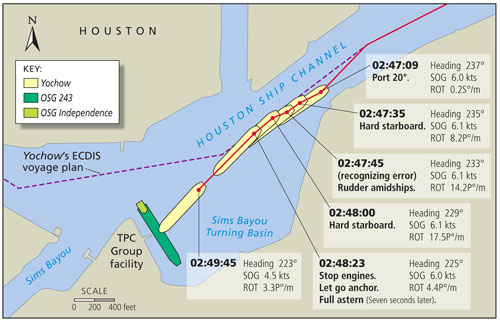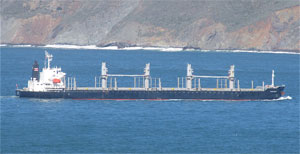The bulk carrier Yochow approached a dogleg turn in the Houston Ship Channel when the pilot ordered the rudder hard to starboard. The helmsman repeated the order but instead turned the rudder in the opposite direction.
Although the Houston pilot recognized the mistake almost immediately, the ship continued moving to port toward a docked articulated tug-barge (ATB). The pilot ordered the anchor dropped and engines astern, but the ship plowed into the empty barge OSG 243 at about 4.5 knots.
Yochow’s bulbous bow was holed by the impact, and OSG 243 sustained extensive damage on deck and along the waterline. The TPC Group terminal where the ATB was docked was most affected, with repairs costing roughly $20 million.
The National Transportation Safety Board (NTSB) investigated the incident, which occurred at 0250 on June 13, 2018, near Sims Bayou in Houston. The agency determined Yochow’s second mate failed to properly monitor the helmsman as he carried out the pilot’s orders, “contrary to the principles of good bridge resource management.”
Investigators also found the helmsman worked more time than was indicated on his log, exceeding limits outlined in international protocols. He also didn’t have relief on the bridge in three hours leading up to the incident.
“Contributing to the accident,” the NTSB said, “was the lack of company and shipboard oversight to ensure crewmembers adhered to work/rest guidelines, resulting in fatigue of the helmsman.”
Yochow, a 590-foot Hong Kong-flagged bulker built in 2015, sailed to Houston with 18 crew after discharging most of its cargo in Veracruz, Mexico, days earlier. The second mate and helmsman came on watch at 2345 on June 12. About 90 minutes later, as the ship approached a channel section known as Lynchburg Landing, the pilot ordered the rudder 20 degrees to port for the sharp turn. As he would do again later that morning, the helmsman instead moved the rudder opposite to the order.
“In catching the error, the pilot ordered ‘midships’ 11 seconds later, then repeated the port-20 order two seconds later,” the NTSB said. “Using a full-ahead bell, the bridge team was able to stop the vessel’s swing to starboard about 38 seconds after the original command to port and regain the channel.
“Following the helmsman’s error and recovery, the pilot and second mate had a brief conversation about the mate’s duty to watch the helmsman,” the report continued. “The second mate agreed to double-check the helmsman with each command.”
 |
|
A diagram from the NTSB report shows Yochow’s trackline and the pilot’s orders leading up to the incident. |
|
NTSB/Pat Rossi illustration |
Another 90 minutes passed uneventfully as the ship headed west toward Sims Bayou. The starboard dogleg turn within the channel required a wider-than-normal approach to pass a dredge operating inside the channel. The ATB tug OSG Independence and OSG 243 were docked at the TPC terminal on the west side of the Sims Bayou Turning Basin.
The pilot gave a “port 20” rudder order at 0247, followed 24 seconds later by the “hard starboard” order. The helmsman instead moved the rudder hard to port. Ten seconds later, the pilot ordered the rudder back to midships, then again hard to starboard. All told, it took about 27 seconds for the rudder to move into the correct position.
Roughly 45 seconds after the helmsman’s error, the pilot ordered, “Stop engines. Let go anchor.” Seven seconds after that, he called for the engines to go full astern to slow the ship, which was traveling at about 6 knots. The ship continued falling to port throughout these maneuvers, and the pilot ordered the alarm sounded.
“The pilot told investigators that increasing the engine speed to power through the turn, as he had done earlier, would risk hitting the tug, which likely had a sleeping crew on board,” the NTSB said in its report. “He chose instead to attempt to stop the vessel and risk hitting the barge ahead of it.”
That is exactly what happened, and Yochow slammed into the barge’s port side. OSG 243 was empty at the time, awaiting a load of the gasoline additive MTBE. The impact from the ship pushed the barge more than 70 feet, damaging pilings and other critical equipment at the TPC facility.
NTSB investigators learned Yochow’s master and the helmsman steering the ship when it crashed did not get the required 10 hours or more of rest in the day leading up to the incident. The master had been working for 18 consecutive hours with only short rest breaks; the helmsman had worked from 0800 to 1730 on deck, with a two-hour lunch break, in addition to eight hours noted on his log.
The agency also highlighted the second mate’s failure to properly monitor the helmsman, particularly after his first steering error 90 minutes before the incident. Standing orders from the master called for officers to monitor the helmsman, and the second mate acknowledged that was part of his normal duties.
“In both cases, the pilot — not the watch officer — noted the error and took action to direct the helmsman to correct the rudder,” the report said, noting that pilots are trained to watch for incorrect helm orders.
Through a spokesman, the Houston Pilots said it had nothing to add to the NTSB findings. Attempts to reach Yochow operator Beikun Shipping Co. of Beijing were not successful.

